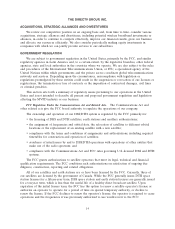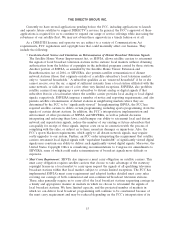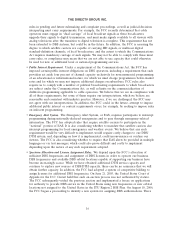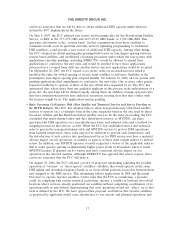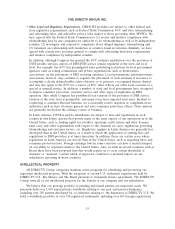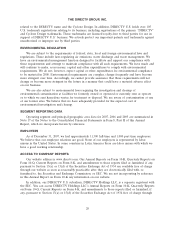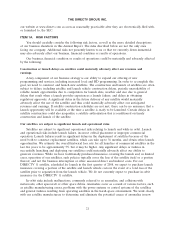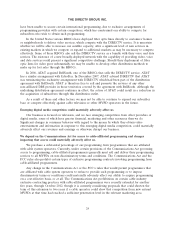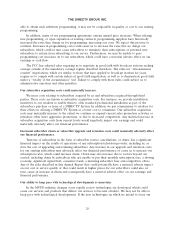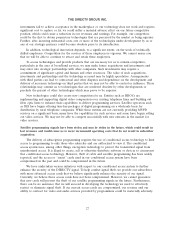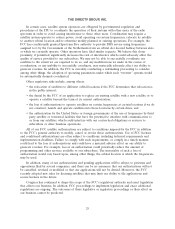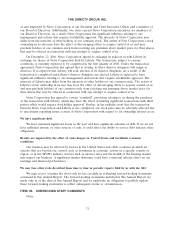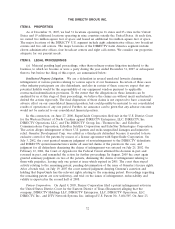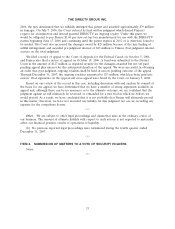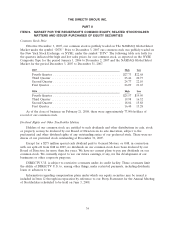DIRECTV 2007 Annual Report Download - page 33
Download and view the complete annual report
Please find page 33 of the 2007 DIRECTV annual report below. You can navigate through the pages in the report by either clicking on the pages listed below, or by using the keyword search tool below to find specific information within the annual report.THE DIRECTV GROUP, INC.
have been unable to secure certain international programming, due to exclusive arrangements of
programming providers with certain competitors, which has constrained our ability to compete for
subscribers who wish to obtain such programming.
In the United States various RBOCs have deployed fiber optic lines directly to customers’ homes
or neighborhoods to deliver video services, which compete with the DIRECTV service. It is uncertain
whether we will be able to increase our satellite capacity, offer a significant level of new services in
existing markets in which we compete or expand to additional markets as may be necessary to compete
effectively. Some of these RBOCs also sell the DIRECTV service as a bundle with their voice and data
services. The existence of a new broadly-deployed network with the capability of providing video, voice
and data services could present a significant competitive challenge. Should their deployment of fiber
optic lines for video grow substantially, we may be unable to develop other distribution methods to
make up for lost sales through the RBOCs.
In 2006, AT&T acquired BellSouth, one of the RBOCs that sells the DIRECTV service. AT&T
has a similar arrangement with EchoStar. In December 2007, AT&T advised DIRECTV that AT&T
was terminating the exclusivity arrangement with DIRECTV which had been part of the distribution
agreement with BellSouth. AT&T is therefore free to sell and promote the services of any other
non-affiliated DBS provider in those territories covered by the agreement with BellSouth. Although the
underlying distribution agreement continues in effect, the action of AT&T could result in a reduction in
the acquisition of subscribers through this distribution outlet.
As a result of these and other factors, we may not be able to continue to expand our subscriber
base or compete effectively against cable television or other MVPD operators in the future.
Emerging digital media competition could materially adversely affect us.
Our business is focused on television, and we face emerging competition from other providers of
digital media, some of which have greater financial, marketing and other resources than we do.
Significant changes in consumer behavior with regard to the means by which they obtain video
entertainment and information in response to this emerging digital media competition, could materially
adversely affect our revenues and earnings or otherwise disrupt our business.
We depend on the Communications Act for access to cable-affiliated programming and changes
impacting that access could materially adversely affect us.
We purchase a substantial percentage of our programming from programmers that are affiliated
with cable system operators. Currently, under certain provisions of the Communications Act governing
access to programming, cable-affiliated programmers generally must sell and deliver their programming
services to all MVPDs on non-discriminatory terms and conditions. The Communications Act and the
FCC rules also prohibit certain types of exclusive programming contracts involving programming from
cable-affiliated programmers.
Any change in the Communications Act or the FCC’s rules that would permit programmers that
are affiliated with cable system operators to refuse to provide such programming or to impose
discriminatory terms or conditions could materially adversely affect our ability to acquire programming
on a cost-effective basis, or at all. The Communications Act prohibitions on certain cable industry
exclusive contracting practices with cable-affiliated programmers were recently extended for another
five years, through October 2012, though it is currently considering proposals that could shorten the
term of this extension to two years if a cable operator could show that competition from new entrant
MVPDs at that time had reached a sufficient penetration level in the relevant marketing area.
24


